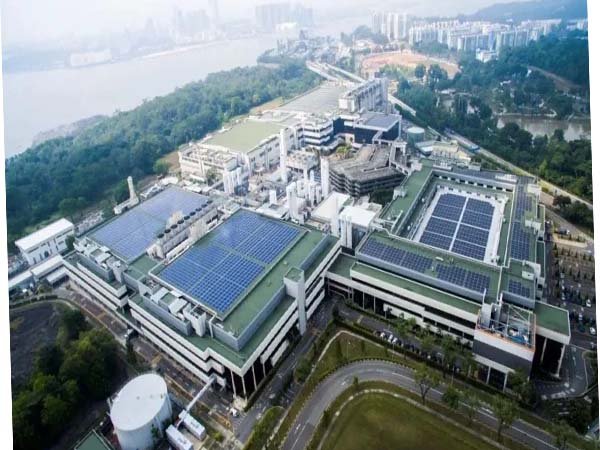Introduction: In addition to Kingsoft, more and more semiconductor manufacturers have built factories in Thailand in recent years. Thailand is the 13th manufacturing base of electronic products and parts in the world, and also a gathering place for Japanese enterprises to make long-term investments. Sony, Rom, Samsung, Murata, Toshiba, Kyocera, etc. have established Fab in Thailand. In addition, NXP, Western Digital and Microcore Technology also have factories in Thailand.
On January 6, according to the Taiwan, China media Economic Daily, Jinshan Electric, a passive component factory, released important news that a fire broke out on the third floor of Thailand Jinshan Electronics Industry Factory 1, a Thai subsidiary, in the afternoon of January 5 local time. The fire was quickly extinguished with the help of the fire department, and no one was injured or killed at the scene, but some equipment was damaged and could not be used.
Jinshan Electric further pointed out that it is currently evaluating the damage of equipment. The company‘s plant and production equipment are all insured against fire insurance, and the relevant claim settlement operations will be handled after contacting the insurance company. As for the capacity, Jinshan Electric said that the affected capacity and capacity allocation will be further evaluated after the fire identification.
According to the data, Jinshan Electric was founded on March 20, 1970, headquartered in Taiwan, China, China, and mainly engaged in the production, manufacturing and sales of aluminum electrolytic capacitors. There are factories in Thailand and Guangzhou, China, which produce polymer solid aluminum capacitors, polymer solid liquid hybrid aluminum capacitors, and aluminum electrolytic capacitors respectively. Established in 1989, Thailand Kingsoft Electronics Industry is a subsidiary indirectly held by Kingsoft, with 94.52% shares. It is responsible for manufacturing materials and processing of aluminum capacitor parts. In 2021, the revenue of Thailand‘s Jinshan Electronics Industry will be NT $841 million.
Source: Network
It is recalled that since the second quarter of last year, passive component manufacturers have successively started to reduce production, driving the inventory adjustment strategy to work. With the solution of the shortage of IC parts, at the end of December last year, the momentum of customers to pull goods recovered, driving the order recovery of Guoju and Huaxinke, and the order receiving situation improved.
According to the report, Guoju said that the orders for niche products are stable at this stage; Huaxinke said that there has been an urgent order for network communication, industrial control and vehicle applications recently. This means that the inventory of passive component laminated ceramic capacitor (MLCC) standards has been reduced to a certain extent, and the shipments of related manufacturers increased gradually in the fourth quarter of last year.
Data shows that there are 750000 people working in the electronics and electrical industry in Thailand, and the Thai government is actively stepping up efforts to improve labor skills to support rapidly changing technologies.
In addition to Kingsoft, more and more semiconductor manufacturers have built factories in Thailand in recent years to alleviate supply chain problems caused by epidemic and international environment. It is reported that Thailand is the 13th manufacturing base of electronic products and parts in the world, and also a gathering place for Japanese enterprises to make long-term investment. Sony, Rom, Samsung, Murata, Toshiba, Kyocera, etc. have all established Fab in Thailand. In addition, NXP, Western Digital and Microcore Technology also have factories in Thailand.
For example, Samsung has six factories in Thailand. Last year, Samsung invested $920 million in its electronic components factory in Thai Nguyen.
For another example, Murata has started to build a factory to produce capacitors in Thailand, which is the first time Murata has produced MLCC products in Thailand. The new factory will cost 12 billion yen and will be put into operation in October 2023. Murata previously operated a factory in Thailand that produces sensors and other electronic equipment.
In addition, Sony Group will invest about 70.7 million dollars to set up a semiconductor factory in the production base in central Thailand. The factory will start operation in the fiscal year ending in March 2025, mainly for manufacturing image sensors.
After all, before that, Thailand also introduced incentives for semiconductors. The Board of Investment of Thailand (BOI) said that companies whose R&D expenditure in the first three years was no less than 1% of their total sales or no less than 200 million baht would be exempted from additional corporate income tax for up to five years, depending on the amount of R&D investment. For companies that increase R&D investment in their main business, the longest joint tax holiday is 13 years.
|
Disclaimer: This article is transferred from other platforms and does not represent the views and positions of this site. If there is any infringement or objection, please contact us to delete it. thank you!
中恒科技ChipHomeTek
|
